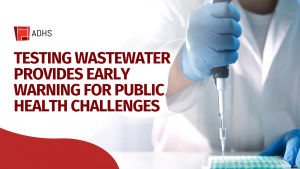
Testing wastewater provides early warning for public health challenges
 Before the first case of influenza was reported in the Flagstaff area this fall, public health researchers from ADHS and Coconino County Health and Human Services already knew it was coming.
Before the first case of influenza was reported in the Flagstaff area this fall, public health researchers from ADHS and Coconino County Health and Human Services already knew it was coming.
How? By testing wastewater for signs of influenza.
Wastewater surveillance for signs of specific diseases is a new and growing tool for public health professionals to get ahead of potential disease outbreaks and minimize the negative impacts of challenges from the flu to opioids and COVID-19.
Public health officials from Tempe and Arizona State University began using wastewater surveillance to check for evidence of opioids in 2018. As the COVID-19 pandemic began in early 2020, they began checking wastewater for indications of coronavirus. Wastewater testing identified areas of COVID-19 concentrations a week or more before tests on patients revealed the same information.
The Centers for Disease Control and Prevention (CDC) launched a nationwide effort to test wastewater for evidence of COVID-19 a few months later. ADHS received funding to begin Arizona’s statewide program in 2021.
There are testing sites around the state, including the counties of Maricopa, Yuma, Coconino, Pima, La Paz and Mohave. Tests take place at ASU and University of Arizona labs, and results are reported to ADHS and the CDC.
While current testing is focused primarily on COVID-19, the potential is tremendous. In addition to current testing for COVID-19, influenza and opioids, mpox (formerly referred to as monkeypox) are among other pathogens that testing could identify.
The goal is to not only identify pathogens earlier, but to provide an early warning to the public and public health officials, including hospitals and other health care settings. The data would be used in making decisions about where to focus resources to limit the spread of any virus.
Challenges remain. Before testing for pathogens, public health officials need to determine proper testing methods and what mitigation strategies to use when pathogen levels are considered too high. The Arizona State Public Health Laboratory does not have the capacity for testing all samples across the state at this time. However, we have started building our capacity to conduct wastewater testing in-house. Testing for COVID-19 and mpox is expected to begin in mid-2023.
Wastewater surveillance provides an exciting opportunity to improve health outcomes across Arizona by looking into the immediate future and getting an earlier start in the battle against disease.

